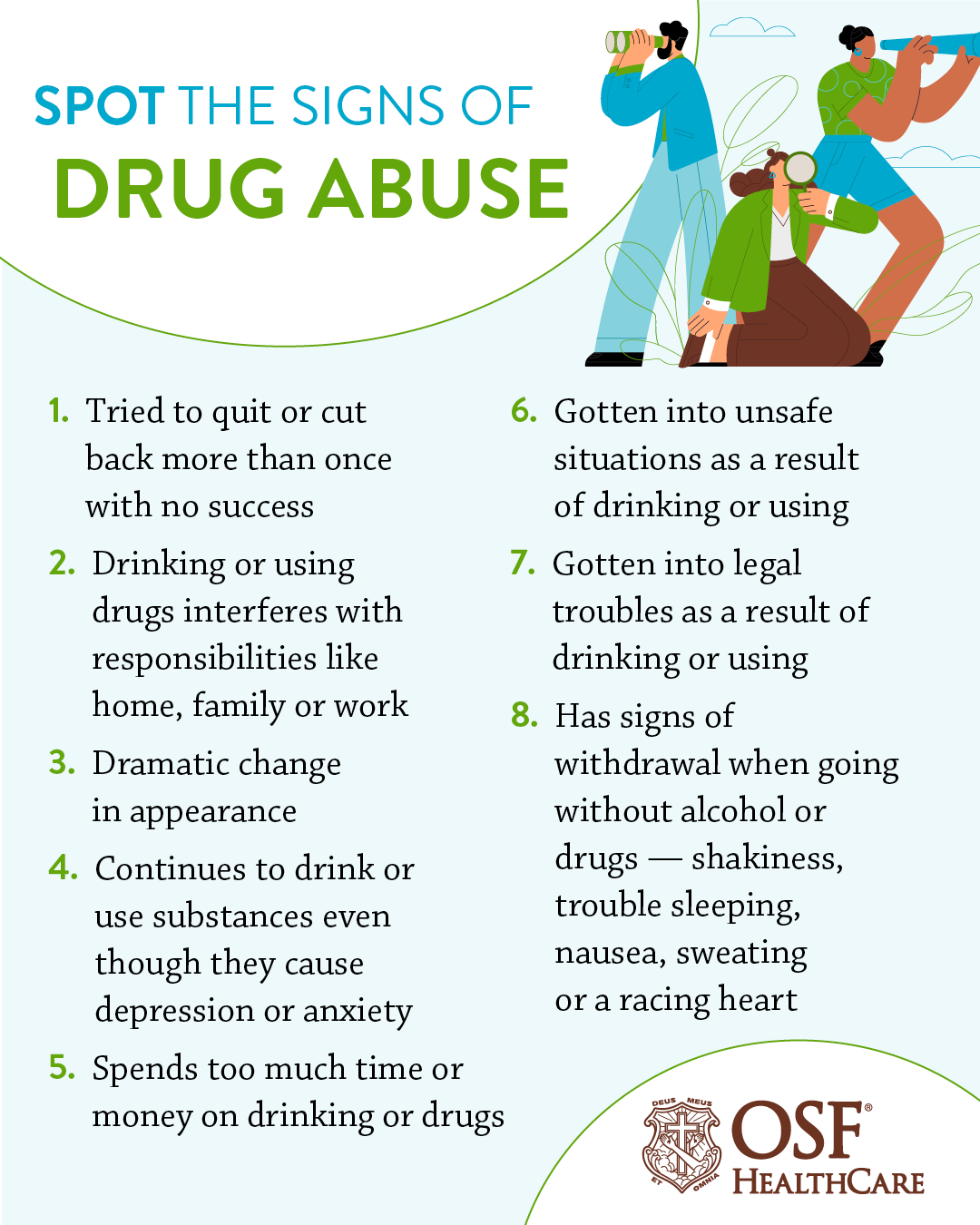
Spot the signs of substance abuse
You’ve noticed some changes in someone you love. They’re not dramatic changes, but they’re enough to make you wonder, “Could it be something more?”
Maybe you’re drinking or using substances. You ask yourself, “Is it too much?”
Perhaps knowing what substance abuse is not would be helpful.
“Substance abuse, or substance use disorder, is a medical condition, just like diabetes or high blood pressure. It is not a moral failing or a lack of willpower,” said Jennifer Wegner, a licensed clinical social worker and program manager of OSF Behavioral Health Substance Use Services.
What does substance use disorder look like?
It is important to be as understanding as possible and avoid passing judgment on someone struggling.
“Substance use disorders can impact anyone, regardless of age, race, gender or socioeconomic status,” Jennifer said. “Any mood or mind-altering substance can be abused.”

Spot the signs.
Download
Substances like alcohol, caffeine, nicotine, cannabis, cocaine, methamphetamine (heroin, as well as opiate prescription pills for pain), opiates, benzodiazepines and hallucinogens can be abused.
If you’ve ever wondered if you or somebody you care about is struggling with substance use disorder, this checklist of symptoms may help you spot some of the signs.
Signs of substance abuse
- Drinking or using more or longer than intended.
Maybe you set out to have two drinks a week. By Wednesday, you’ve already consumed 10 drinks.
- Trying to cut down or stop, but you can’t.
If you’ve told yourself or others that you are going to cut back or stop drinking or using altogether, but haven’t been able to, this may indicate you are dependent on a substance.
- Getting into unsafe situations because of drinking or using.
Have you gotten in the car to drive while under the influence, made risky decisions or put someone you love in danger because you were drinking or using?
- Drinking or using more than you once did.
You once didn’t need so much of a certain substance, but now you need to keep drinking or using to feel the effect you desire.
- Continuing to drink or use even though it makes you anxious or depressed.
You know that a certain substance interferes with your mental well-being, but you use anyway.
- Continuing to drink or use even though it causes trouble with your family, friends or responsibilities.
Your substance use has caused fights with and isolation from loved ones. You find yourself choosing to drink or use over your family and friends. You let drinking or using come before work and school obligations.
- Getting into legal or financial troubles because of drinking or using.
Have you been arrested or spent the night in jail because of your use? Have you failed to pay your bills because you’ve spent so much money on using substances?
- Experiencing withdrawal symptoms when substances wear off.
You have trouble sleeping, shakiness, restlessness, nausea, sweating, racing heart or seizure when you don’t drink or use.
- Drinking or using instead of doing activities you enjoy.
You enjoy fishing, reading or biking, but you’ve given that up or cut back in order to drink or use.
Helping someone who may be struggling
It can be very emotionally, mentally and physically challenging traveling the road of substance use disorder alongside someone you love. So, how can you help?
There are treatment options available for those experiencing substance use disorder. Pointing a loved one in the right direction is a good start.
Know your options.
Suggest your loved one talk to their doctor. There are also many alternative and convenient options for getting on the road to recovery. Options such as virtual recovery support groups, helplines to speak with someone on the phone, texting resources and many more make it easy to take that first step.
And if that is too overwhelming or you are pressed for time, behavioral health navigators at OSF HealthCare can be a valuable access point for finding all the right resources. They will help you connect with care, understand the resources available to you and link you to the services that will best fit your needs. The service is free of charge and available to all, regardless of whether you are an OSF HealthCare patient.
There is hope.
“Treatment can work,” Jennifer said. “People recover from substance use every day.”